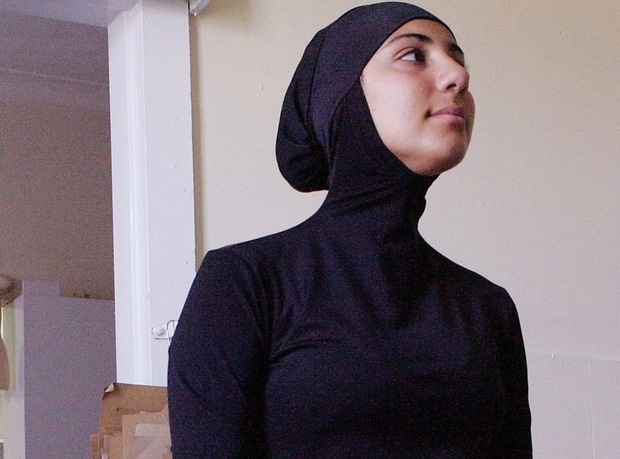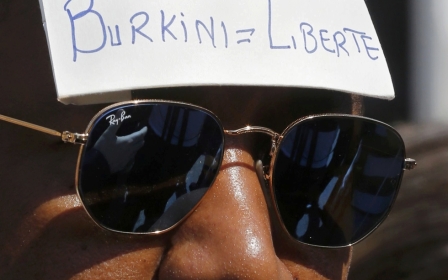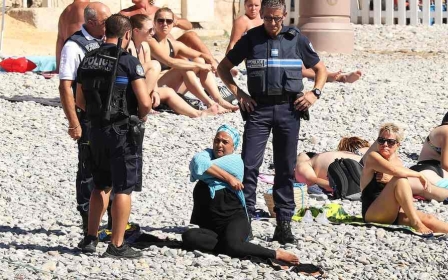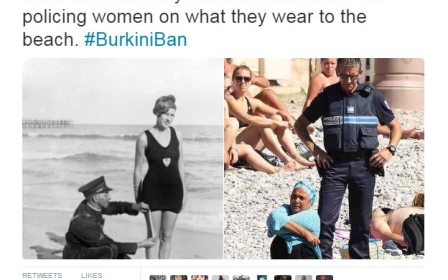From 'ridiculous' to 'necessary,' Parisians sound off on banning 'burkinis'

PARIS - France’s highest court earlier today suspended a mayoral decree banning the “burkini” in the city of Nice.
Nice has been in the spotlight the past month since a horrific truck-ramming attack in which 86 people were killed by an Islamic State (IS) group supporter. This followed the coordinated November 2015 Paris attacks that killed 130 people.
France has been in a prolonged state of emergency that has seen the state orchestrate a crackdown against individuals linked to IS.
The state of emergency has also led to a discussion about Muslim identity and the status of minority groups in the French Republic, with debate about the burkini at the forefront.
Nice’s Deputy Mayor Christian Estrosi described the burkini “as not in keeping with our ideal of social relations”.
But what do French people actually think about the burkini debate? MEE spoke with a number of French citizens on a makeshift beach on the riverbank of the famous River Seine.
Alice Witteverongeo, an agriculture student born and raised in Paris, told Middle East Eye that she didn't understand what the ban aimed to achieve.
"From what I see on social media, the ban clearly alienates Muslim women and make them feel unwelcome," Witteverongeo said.
"I don't understand or get what the ban aims to achieve as it is something that is totally against French values and its culture," she added.
"But what I found strange is that my parents believe the ban is a good thing and is absolutely necessary. They find it offensive that people are trying to be different and not fit into French customs and culture."
Claudia Vierie, an architect from Marseille also spoke about upholding secular values in France.
"These values were established to uphold our freedoms, not to intimidate and force people to behave in a certain way," Vierie said.
"For a long time, many within French society have been silent on how the far right has manipulated these values.
“Now we are seeing conservative politicians like [former president of France Nicolas] Sarkozy using this very language to get elected, and it is not helpful for social cohesion."
As the debate over burkinis intensifies, the polarised views on the swim garb appear to be along generational divides. Older Parisians tend to be more in favour of the ban.
Michel Jacque, a retired policeman, told MEE that the ban was needed to build a more “French society”.
He said the court made its decision based on pressure from “left-wing organisations” and did not have “the interests of the French people at heart”.
“This is yet another example of how the establishment bows down to pressure from left-wing organizations and the media,” Jacque said.
He added: “There is a reason why these terrorist attacks keep happening and it is because these people (Muslims) are not French enough and this needs to change”
Ben Yosef, a writer in his late 50s from Cannes, said the ban was necessary to confront the use of clothing to make political statements.
“Have you seen how many times we have been attacked in the last few years?” Yosef said.
“We need to confront this terror that is killing our people on a monthly basis, and if that means banning the swimsuit with a political message, then so be it,” he added, then continued cycling along the Seine.
Both Jacque and Yosef’s comments are similar to the rhetoric of Sarkozy, who is once again running to be France's president.
After losing the office in 2011 to Francois Hollande, Sarkozy commenced his current presidential campaign with a speech denouncing minority groups, left-wing organisations and Muslims for “robbing” France of its identity.
Speaking to hundreds of party supporters, Sarkozy was met with applause as he called for a nationwide ban on the burkini and for mandatory French lessons to be introduced to all minorities.
“I refuse to let the burkini impose itself at French beaches and swimming pools ... there must be a law to ban it throughout the Republic’s territory," he said.
Many commentators described Sarkozy as adopting the rhetoric of the far-right in a bid to garner votes from the Front Nationale.
The presidential elections come after terror attacks have left the nation exhausted and on edge.
Malika Hammad, a media project manager based in the centre of Paris, told MEE that the burkini debate was a distraction from bigger issues affecting French society today.
“The [burkini] debate is ridiculous in comparison to the bigger issues plaguing French society,” Hammad said.
“France is going through the biggest economic crisis of its time, from high unemployment to an education system that is failing the most vulnerable, and yet we are spending our time debating a piece of clothing,” she said.
Many mayors from the south of France, where the ban against the burkinis originated, have vowed to disobey the new ruling.
The declaration by French mayors puts them at odds with France’s highest court, as civil rights groups have also vowed to challenge the burkini ban.
New MEE newsletter: Jerusalem Dispatch
Sign up to get the latest insights and analysis on Israel-Palestine, alongside Turkey Unpacked and other MEE newsletters
Middle East Eye delivers independent and unrivalled coverage and analysis of the Middle East, North Africa and beyond. To learn more about republishing this content and the associated fees, please fill out this form. More about MEE can be found here.




